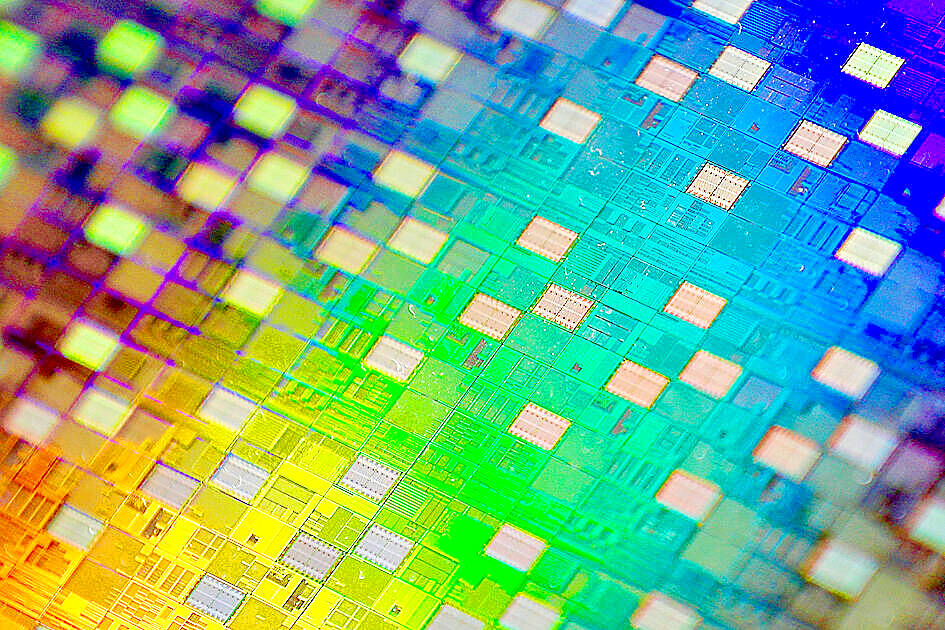A recent meeting of the “Fab 4” alliance focused on establishing an early warning system for the semiconductor industry to improve supply chain resilience, a Ministry of Economic Affairs (MOEA) official said on Saturday.
Responding to reports earlier on Saturday that the four countries in the alliance — Taiwan, Japan, South Korea and the US — held a videoconference, the Ministry of Foreign Affairs confirmed that the meeting was held on Feb. 16.
It was the first formal meeting of the alliance, also known as the “Chip 4,” following a preparatory meeting held virtually in September last year after months of coordination among the four countries, the ministry said.

Photo: EPA-EFE
An MOEA official said that Taiwanese representatives at the one-hour meeting stressed the importance of creating an early warning system that covered all aspects of the complicated semiconductor supply chain, including raw materials and equipment.
The early warning system is critical, given the major chip shortages that occurred during the COVID-19 pandemic and the need for the four nations involved to communicate effectively to predict when other supply chain issues could occur, the official said.
An early warning system would also undoubtedly benefit Taiwanese IC suppliers, and even the local supply chain, the official added.
The US-led Chip 4 alliance is widely seen as a Washington initiative to contain Beijing in the cutting-edge sector.
However, the official said that the one-hour meeting did not touch on export controls or ties with China.
US President Joe Biden’s administration issued sweeping new rules in October last year that include restrictions on the supply of US manufacturers’ most advanced chipmaking equipment to Chinese customers and limits on Americans working for Chinese semiconductor firms, a move aimed at choking off access to certain expertise.
China, the top trading partner of Taiwan, Japan and South Korea, has said that the US effort showed its “selfish hegemonic interest.”
The US has secured an agreement with the Netherlands and Japan to restrict exports of some advanced chipmaking machinery to China.
At the Feb. 16 meeting, the US representatives emphasized the complementary nature of the alliance in the global semiconductor supply chain, with Taiwan and South Korea’s expertise in manufacturing, the US’ upper hand in equipment supplies and IC design, and Japan’s edge in IC material supplies, the MOEA official said.
The meeting was hosted by the American Institute in Taiwan, the de facto US embassy in Taipei, South Korea’s Yonhap News Agency reported.
Additional reporting by Bloomberg

Conflict with Taiwan could leave China with “massive economic disruption, catastrophic military losses, significant social unrest, and devastating sanctions,” a US think tank said in a report released on Monday. The German Marshall Fund released a report titled If China Attacks Taiwan: The Consequences for China of “Minor Conflict” and “Major War” Scenarios. The report details the “massive” economic, military, social and international costs to China in the event of a minor conflict or major war with Taiwan, estimating that the Chinese People’s Liberation Army (PLA) could sustain losses of more than half of its active-duty ground forces, including 100,000 troops. Understanding Chinese

The Ministry of Foreign Affairs (MOFA) yesterday said it is closely monitoring developments in Venezuela, and would continue to cooperate with democratic allies and work together for regional and global security, stability, and prosperity. The remarks came after the US on Saturday launched a series of airstrikes in Venezuela and kidnapped Venezuelan President Nicolas Maduro, who was later flown to New York along with his wife. The pair face US charges related to drug trafficking and alleged cooperation with gangs designated as terrorist organizations. Maduro has denied the allegations. The ministry said that it is closely monitoring the political and economic situation

UNRELENTING: China attempted cyberattacks on Taiwan’s critical infrastructure 2.63 million times per day last year, up from 1.23 million in 2023, the NSB said China’s cyberarmy has long engaged in cyberattacks against Taiwan’s critical infrastructure, employing diverse and evolving tactics, the National Security Bureau (NSB) said yesterday, adding that cyberattacks on critical energy infrastructure last year increased 10-fold compared with the previous year. The NSB yesterday released a report titled Analysis on China’s Cyber Threats to Taiwan’s Critical Infrastructure in 2025, outlining the number of cyberattacks, major tactics and hacker groups. Taiwan’s national intelligence community identified a large number of cybersecurity incidents last year, the bureau said in a statement. China’s cyberarmy last year launched an average of 2.63 million intrusion attempts per day targeting Taiwan’s critical

AGING: As of last month, people aged 65 or older accounted for 20.06 percent of the total population and the number of couples who got married fell by 18,685 from 2024 Taiwan has surpassed South Korea as the country least willing to have children, with an annual crude birthrate of 4.62 per 1,000 people, Ministry of the Interior data showed yesterday. The nation was previously ranked the second-lowest country in terms of total fertility rate, or the average number of children a woman has in her lifetime. However, South Korea’s fertility rate began to recover from 2023, with total fertility rate rising from 0.72 and estimated to reach 0.82 to 0.85 by last year, and the crude birthrate projected at 6.7 per 1,000 people. Japan’s crude birthrate was projected to fall below six,